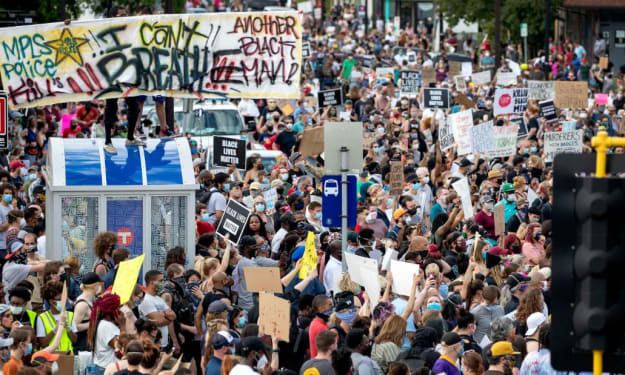
"All of history is a struggle of the individual against the institutions." --Emma Goldman
Modern America, the "Land of the Free," incarcerates more people than any other nation on Earth, including China. We spend more on military spending than the next twenty-five countries combined. We give more in "corporate welfare" than we do in human welfare, healthcare, or the basic services to common citizens. In the film, Anarchism in America, made by filmmakers Joel Sucher and Steven Fischler of Pacific Street Films (which was founded in 1969 as a way to document the continual struggle of radical groups against the Vietnam War and other social ills), we see the various modes of anarchist thought and philosophy in the emerging era of greed and corruption, the trickle-down era of Reaganomics. These are the roots of where we find ourselves today, so to look at the past (which, to quote a certain film, "is prolog") is important.
Most people associate the term "anarchy" (i.e. without government) to mean chaos, violence, and disorder. Most don't associate it with a long and distinguished philosophical and ethical worldview, one wherein loose federations and voluntary free men and women would work together, without the benefit of state control, for mutual self-interest. That, indeed though, is what is at bottom of the anarchist way of thinking. Instead of the violence and disorder decried by the bourgeois propagandists of both left and right-wing camps, anarchism is simply a desire for personal autonomy without rigid control over the life and property of the individual--a control that is seen as, ultimately, soul-destroying and rooted in the same hypocrisy and avarice as the radical left always maintained it was really against.
The film Anarchy in America explores the personal evolution of men such as Karl Hess and Murray Bookchin, both of whom came into anarchism by way of radically different political and philosophic journeys. Hess, a staunch Republican who worked on the campaign of Barry Goldwater, saw in his journey from Republicanism to Libertarianism, to outright anarchism, all the principles of self-interest and radical individualism as outlined by Ayn Rand in her divisive and egoistic philosophy of Objectivism. An apparent tax resister, Hess begins the film by laughing at his seeming problems with the IRS.
By contrast, the erudite and loquacious Murray Bookchin, an old-time labor organizer who spent his life a Stalinist, and then a Trotskyist, before finally discovering anarchism, is motivated most obviously from a disillusionment with the utopian ideals of the Marxist Left, who simply "replace one set of masters with another." That's not an exact quote, but close enough.
The film likewise features a rare interview with old-time anarchist ideolog Emma Goldman, a stout, "iron lady" who freely confesses to refusing to give up her principles. Comically, when asked about Italy, she replies, "Absent Mussolini, a beautiful country."
Indeed it was Italian anarchists, such as Renzo Novatore and Bruno Filippi, men of her generation, who were both men that died violent deaths, both totally committed to the cause of smashing the state in the name of ultimate human liberation; freedom from war, oppression, poverty, and coercion. Their powerful, incendiary writings survive them. But, did they sacrifice themselves foolishly for a pointless, if noble cause?
Such violence as was proferred by these early anarchists is documented at the beginning of the film. Over the jarring sounds of "Anarchy in the UK" by the Sex Pistols, old-school militant Weatherman-style guerillas are seen tossing smoke bombs and Molotovs, fighting in the streets. This is the holdover image proffered by the establishment in the Sixties; not that there is not some truth there; but, like everything, it is a distorted truth, passed through the lens of those who have no interest in presenting their antagonists in any objective manner. Out of the bourgeois establishment, this is to be expected. No propagandist paints from a pallet of objectivity.
By contrast, and contrasted with the "man on the street" spot interviews wherein "regular folks" are asked to describe what they think of when they hear the word anarchy (one man, most hilariously, pegs Ayatollah Khomeini as being a dyed-in-the-wool anarchist), is an "anarchist symposium," which hardly seems any more threatening than a faculty wine and cheese. A woman wearing a pearl necklace and heavy makeup is asked, for instance, if she considers herself an anarchist. The viewer already knows she is simply there from a political or philosophic confusion, or a desire to be seen as chic, radical, or just to please another.
The viewer of Anarchism in America will indeed be asking themself just how serious these people can be--are one of them going to sacrifice themselves, such as old-time anarchists like Novatore and Filippi, to render a "strike to the system"? No. Murray Bookchin confesses that to his "communist friends" the perception that he is a threat is already there, subtly. "They tell me they're going to shoot me. In other words, when their revolution comes, I'm going 'up against the wall.'" Again, not a direct quote, but you get the idea.
Men have certainly gone "up against the wall" in the name of fighting for anarchist principles. Sacco and Vanzetti are covered in the film extensively. Convicted and executed on the flimsiest evidence, they became a cause celebre but were executed nonetheless in 1927. Afterward, the National Guard was called up to quell rioters. Anarchists, like all other adherents of radical left or revolutionary politics seeking to overthrow the status quo, were brutally tamped down upon; and, in truth, always have been.
The Spanish Civil War of 1936 is also covered, a period of three years in which an anarchist front held out against a brutal fascist uprising. During that time, they instituted many progressive changes, including free schools, libraries, and cultural centers for the peasantry, workers co-ops, and a system of bartering to replace profit. This existed for three years in Spain, under the banner of the anarchist CNT and FAI. The possibility of a future world without compulsive hierarchies, and exploitation, is not a notion too fantastical to entertain, then.
Bookchin complains that the Left, by contrast, simply, "Takes power from one class and gives it to another."
The Boss is a bastard. He's out for himself, and to squeeze the worker in the name of maximizing PROFIT. "The boss needs us, we DON'T NEED THE BOSS," is an old slogan. If the Boss is allowed to continue presently, the Ruling Class will continue to simply hoard the wealth and resources of the world, while the rest of the rats overflow the sinking ship of state--the Ship of Fools. An "American Attitude", as observed by one man interviewed, is to "break all the rules...fuck you! Whoever gets on the bus rides first!" Quite possibly, but, not in the era this film was made. Reagan's America was a uniquely neutered, materialistic, and greedy era, a decade when power and profit at the expense of people were championed. Despite Ronnie's image as an all-American Wild West cowboy, the Eighties were a staid, conservative decade of mundane values and designer jeans, pop music, and universally white standards of behavior and beauty. But, beneath the surface, discontent on the part of the have-nots, of those left behind, was brewing.
Today, the wealth gap, ever-widening while wages stagnate, has shown itself to be damn near insurmountable. Today, police violence can spark the tinderbox of racial and social tensions, and the perception that a presidential election was rigged can trigger a violent assault on the sacrosanct U.S. Capitol. Riots are endemic, and the filthy rich get even richer, while thousands upon thousands upon thousands face homelessness and hunger.
Today, post-2008 economic crash and the resultant banker bailout, the transfer of huge swaths of wealth to the elite post-pandemic economic crisis; after Occupy, and Black Lives Matter and the push to defund America's brutal police forces (or, at the very least, to reign them in and get them under control), the old-guard anarchism and naivety of this era can seem quaint and outmoded; or, perhaps, the struggle seems near futility, a neverending and pointless banging of the collective head of activists against a wall. After all, the Masters are still the Masters; the rest of everyone else is increasingly relegated, it seems, to be one of the shiftless, disinherited masses of unemployed and underemployed peons, all of whom have been promised the "carrot on the stick" of the American Dream. None of them will ever be able to attain it in the rigged game of neoliberal American capitalism.
The film ends with a surprise performance by the Dead Kennedys. A young Jello Biafra is interviewed lastly. Since I have listened to the Dead Kennedys for most of my life, I immediately, inwardly smiled. A much younger, much thinner Jello Biafra observes that anarchist ideals will only prevail, "Long after we're all dead!"
True.
Nonetheless, the struggle continues.
Anarchism in America can be viewed for free on YouTube.
About the Creator
Tom Baker
Author of Haunted Indianapolis, Indiana Ghost Folklore, Midwest Maniacs, Midwest UFOs and Beyond, Scary Urban Legends, 50 Famous Fables and Folk Tales, and Notorious Crimes of the Upper Midwest.: http://tombakerbooks.weebly.com






Comments
There are no comments for this story
Be the first to respond and start the conversation.